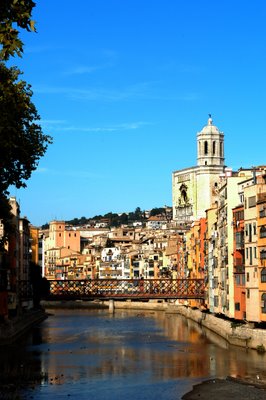One of the best of the Spanish situation comedy television offerings is Aquí no hay quien viva a show about a group of residents sharing an apartment block in
Try and translate the title in any automatic translation and you end up with a rather unfortunate ‘Here there are not some who lives’. I believe the spirit of the meaning is that everybody is represented here, everybody being Spanish characters.
On entering the building you may expect to meet Emilio Delgado the buildings caretaker, though he is always difficult to find. Emilio is often used to link the stories that are unfolding in different parts of the communal building. His attempt to better himself by attending university resulted in an affair with his professor and surprisingly at least to him low grades.
Mariano is Emilio’s father he comes from the
Emilio’s former girlfriend is Belén López she and Emilio often rekindle their relationship despite both pursuing other partners. Belén’s lurches from one job to the next just as she does in her relationships.
Belen’s friend of whom she is quite envious is Lucía Álvarez, a glamorous blonde from a rich background who is always being perused by male admirers.
Joining this community means that you will have to deal with the community president Juan Cuesta.
As ‘El Presidente’ Juan is the residents focus for all things to do with the administration of the building. He is a school teacher. Being the president of a community is an honorary position, and Juan feels proud and even ennobled by his election; despite being continually derided by his fellow occupants. Juan’s nobility does not preclude him from becoming involved in the dodgy dealings that take place daily in the building. He does however fear the consequences of being found out by the authorities, and his nerve will often fail him.
Isabel a nurse and former hippy is Juans live in girlfriend, when stressed she smokes a water pipe. The other residents call Isabel the herb-girl or grass, Las Hierbas. The children of the combined families are a constant worry for thier parents.
At the video store Paco is the store and bar keeper he is a film buff and fool and is often in the company of the wasters from the community including José Miguel son of the president, he is known as Josemi.
One of the funniest characters is Mauricio Hidalgo always called Mauri. A gay man who is living with his lesbian flat mate Bea, and their child Ezequiel who was conceived by artificial insemination. Mauri’s boyfriend is the community lawyer Fernando. Mauri often finds himself under the watchful gaze of Las Jubiladas a group of three retired women with nothing to do but meddle.
The jubiladas are, Concha always in arrears with her community taxes but always the first to make demands on the president. She constantly refers to him as a thief, shouting ¡chorizo! At him as he skulks away.
Concha’s sidekicks are Marísa and her sister Vicenta. Now into their seventies the sisters are like chalk and cheese; whilst Marisa has remained a wild child, drug using and hard drinking, Vincenta is genial and still a quite naïve virgin who is saving herself and still hopes to find a husband.
There are two men who constantly compete for the affections of Lucia, they are now flatmates and thus able to keep an eye on each other. They are the Architect Roberto and a would be businessman Carlos.
Carlos now owns the video shop and once tried his hand at being community president.



